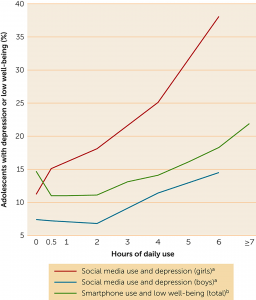Social media has become the new outlet for social interaction. 90% of teens have used social media, with 51% checking their accounts at least once daily. Teens grow up constantly exposed to filtered selfies, photo-shopped pictures, and edited videos that have become the new, unrealistic expectation they try to live up to. As Netsanity puts it, “If aliens from another galaxy were to learn about humans via social media, they would conclude that everyone is flawless and life is perfect.”
They are not wrong. When scrolling through your social media feed, you are bombarded with what are perceived to be the “perfect” photos; everyone is always smiling, the pictures look perfect, and you would think they are having the time of their lives. But, behind the screen, these kids have just spent 20 minutes posing for the perfect selfie and are frantic because they don’t have enough likes.
Living up to this portrayed persona takes a huge toll on your self esteem. As HealthCorps says, “It can become increasingly difficult to maintain a perfect version of yourself, which can cause frustrations and feelings of low self-esteem, particularly when your social media image doesn’t match your real life one.”
This serious pressure teens put upon themselves is not healthy. By letting likes and comments affect their personal self worth, they are granting power to anyone, with a click of a finger, to change their self perception. That is a very scary thing. As HealthCorps further explains, “Likes and comments are signs of validation. The more likes we get, the better we tend to feel. But when this happens, we place the value of others’ opinions above our own. Letting other people determine your self-worth is a surefire way to destruct self-confidence and feel less-than-adequate.”
This is exactly true. Teens monitor their likes and comments as if their life depends on it, and in some aspects, it does. One study at the University of Rochester showed that a lack of validation on social media can increase depression and anxiety.
With teenage suicide, depression, and anxiety rates on the rise and teenagers developing a unhealthy dependence on social media for their self validation, where do we draw the line?
Social media itself is not the problem. The real issue is when teens allow it to take over their lives. Teens need to do whatever they feel is necessary, whether it is taking a break from social media or using it less often, to realize that they don’t need validation through social media to feel good about themselves.
By putting down their screens and throwing away their fake online personas, teens will be able to look inside to discover their own self worth.

